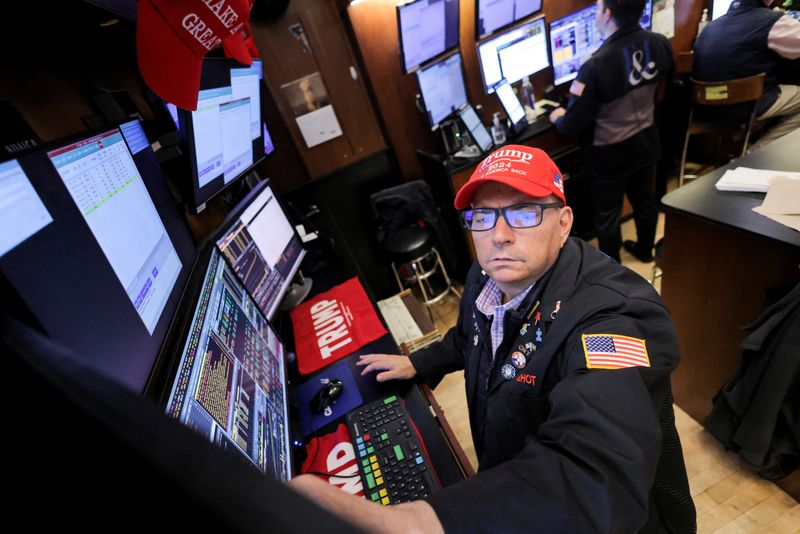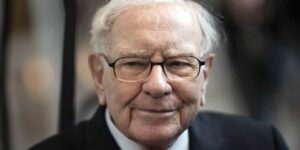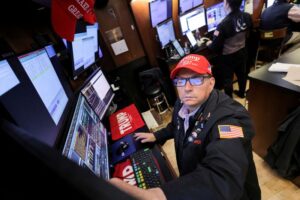S&P 500 snaps 9-session win streak after latest Trump tariff


By Chuck Mikolajczak
NEW YORK (Reuters) -The S&P 500 fell to snap its longest streak of gains in 20 years on Monday as investors assessed U.S. President Donald Trump’s latest tariff announcement ahead of the Federal Reserve’s monetary policy decision later this week.
On Sunday, Trump announced a 100% tariff on movies produced outside the U.S. but provided no details on how such levies would be implemented.
Stocks have been volatile since Trump announced his first round of tariffs on April 2, with the S&P 500 initially dropping nearly 15%, only to stabilize and climb for the last nine straight sessions through Friday, its longest streak since 2004.
On Monday, Treasury Secretary Scott Bessent said Trump’s tariff, tax-cut and deregulation agenda would work together to drive long-term investment to the U.S., adding markets could overcome any short-term turbulence.
“Nine up days in the S&P 500 is hard to maintain,” said Art Hogan, chief market strategist at B Riley Wealth in Boston.
“We are starting to price in that eventuality of deals being announced, but we’re running out of daylight on that because every week that goes by that we don’t start cutting deals we’re doing economic damage.”
The Dow Jones Industrial Average fell 98.60 points, or 0.24%, to 41,218.83, the S&P 500 lost 36.29 points, or 0.64%, to 5,650.38 and the Nasdaq Composite lost 133.49 points, or 0.74%, to 17,844.24.
The Dow also snapped a nine-session win streak, its longest since December 2023.
Several movie and television production stocks fell sharply right after Trump’s announcement, but subsequently pared losses.
Netflix fell 1.9% to snap an 11-session winning streak, while Amazon.com lost 1.9% and Paramount Global was 1.6% lower.
Energy, down 2%, was the worst performer of the 11 major S&P sectors, after OPEC+ decided to speed up its output hikes, causing concerns about more supply as demand remains uncertain.
Class B shares of Berkshire Hathaway stumbled 5.1% after Warren Buffett said he will step down as CEO of the conglomerate.
On the economic front, the Institute for Supply Management survey showed the services sector picked up growth in April, while a measure of prices paid by businesses for materials and services raced to the highest level in more than two years, indicating tariffs were causing inflation pressures to build.
Investors will closely eye the Fed’s policy announcement on Wednesday, in which the central bank is largely expected to keep interest rates unchanged. Commentary from Fed Chair Jerome Powell will be scrutinized for signs of when the Fed will adjust monetary policy.
Markets are pricing in about 75 basis points of rate cuts by the Fed for 2025, with the first easing of at least 25 basis points likely at the central bank’s July meeting, according to LSEG data.
Investors are also concerned about how tariffs may affect corporate profitability. Tyson Foods tumbled 7.7% after the meat packer missed quarterly revenue expectations.
However, Skechers surged 24.3% after the footwear maker agreed to be taken private by 3G Capital in a $9.4 billion deal.
Declining issues outnumbered advancers by a 1.88-to-1 ratio on the NYSE and by a 1.79-to-1 ratio on the Nasdaq.
The S&P 500 posted nine new 52-week highs and three new lows, while the Nasdaq Composite recorded 53 new highs and 57 new lows.
Volume on U.S. exchanges was 13.67 billion shares, compared with the 18.68 billion average for the full session over the last 20 trading days.
(Reporting by Chuck Mikolajczak; Additional reporting by Purvi Agarwal and Johann M Cherian in Bengaluru; Editing by Richard Chang)








